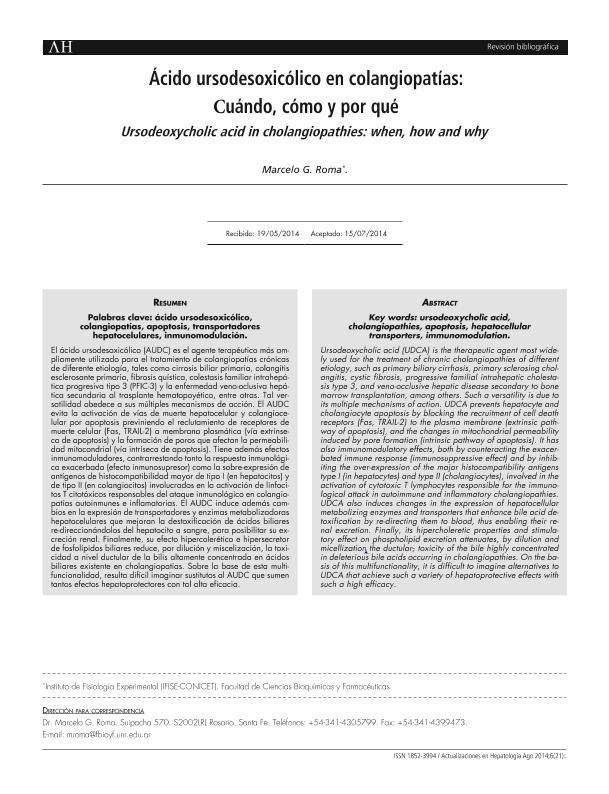Artículo
El ácido ursodesoxicólico (AUDC) es el agente terapéutico más ampliamente utilizado para el tratamiento de colangiopatías crónicas de diferente etiología, tales como cirrosis biliar primaria, colangitis esclerosante primaria, fibrosis quística, colestasis familiar intrahepá- tica progresiva tipo 3 (PFIC-3) y la enfermedad veno-oclusiva hepá- tica secundaria al trasplante hematopoyético, entre otras. Tal versatilidad obedece a sus múltiples mecanismos de acción. El AUDC evita la activación de vías de muerte hepatocelular y colangiocelular por apoptosis previniendo el reclutamiento de receptores de muerte celular (Fas, TRAIL-2) a membrana plasmática (vía extrínseca de apoptosis) y la formación de poros que afectan la permeabilidad mitocondrial (vía intríseca de apoptosis). Tiene además efectos inmunomoduladores, contrarrestando tanto la respuesta inmunológica exacerbada (efecto inmunosupresor) como la sobre-expresión de antígenos de histocompatibilidad mayor de tipo I (en hepatocitos) y de tipo II (en colangiocitos) involucrados en la activación de linfocitos T citotóxicos responsables del ataque inmunológico en colangiopatías autoinmunes e inflamatorias. El AUDC induce además cambios en la expresión de transportadores y enzimas metabolizadoras hepatocelulares que mejoran la destoxificación de ácidos biliares re-direccionándolos del hepatocito a sangre, para posibilitar su excreción renal. Finalmente, su efecto hipercolerético e hipersecretor de fosfolípidos biliares reduce, por dilución y miscelización, la toxicidad a nivel ductular de la bilis altamente concentrada en ácidos biliares existente en cholangiopatias. Sobre la base de esta multifuncionalidad, resulta difícil imaginar sustitutos al AUDC que sumen tantos efectos hepatoprotectores con tal alta eficacia. Ursodeoxycholic acid (UDCA) is the therapeutic agent most widely used for the treatment of chronic cholangiopathies of different etiology, such as primary biliary cirrhosis, primary sclerosing cholangitis, cystic fibrosis, progressive familial intrahepatic cholestasis type 3, and veno-occlusive hepatic disease secondary to bone marrow transplantation, among others. Such a versatility is due to its multiple mechanisms of action. UDCA prevents hepatocyte and cholangiocyte apoptosis by blocking the recruitment of cell death receptors (Fas, TRAIL-2) to the plasma membrane (extrinsic pathway of apoptosis), and the changes in mitochondrial permeability induced by pore formation (intrinsic pathway of apoptosis). It has also immunomodulatory effects, both by counteracting the exacerbated immune response (immunosuppressive effect) and by inhibiting the over-expression of the major histocompatibility antigens type I (in hepatocytes) and type II (cholangiocytes), involved in the activation of cytotoxic T lymphocytes responsible for the immunological attack in autoimmune and inflammatory cholangiopathies. UDCA also induces changes in the expression of hepatocellular metabolizing enzymes and transporters that enhance bile acid detoxification by re-directing them to blood, thus enabling their renal excretion. Finally, its hipercholeretic properties and stimulatory effect on phospholipid excretion attenuates, by dilution and micellization the ductular, toxicity of the bile highly concentrated in deleterious bile acids occurring in cholangiopathies. On the basis of this multifunctionality, it is difficult to imagine alternatives to UDCA that achieve such a variety of hepatoprotective effects with such a high efficacy.
Ácido ursodesoxicólico en colangiopatías: Cuando, cómo y por qué
Título:
Ursodeoxycholic acid in cholangiopathies: when, how and why
Fecha de publicación:
09/2014
Editorial:
ARKHETYPO
Revista:
Actualizaciones en Hepatología
ISSN:
1852-3994
Idioma:
Español
Tipo de recurso:
Artículo publicado
Clasificación temática:
Resumen
Palabras clave:
Ácido Ursodesoxicólico
,
Colangiopatías
,
Colestasis
,
Mecanismos de Acción
Archivos asociados
Licencia
Identificadores
Colecciones
Articulos(IFISE)
Articulos de INST.DE FISIOLOGIA EXPERIMENTAL (I)
Articulos de INST.DE FISIOLOGIA EXPERIMENTAL (I)
Citación
Roma, Marcelo Gabriel; Ácido ursodesoxicólico en colangiopatías: Cuando, cómo y por qué; ARKHETYPO; Actualizaciones en Hepatología; 6; 21; 9-2014; 19-32
Compartir




